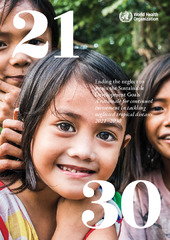
Rationale for investing in NTDs
WHO NTDs Department has recently launched another companion document to the NTDs Road map 2021-2030: A rationale for continued investment in tackling neglected tropical diseases. This new publication was written to motivate investment to reduce the burden of NTDs for millions of people worldwide.
The publication emphasises that investing in actions to combat NTDs is both economical and equitable. NTDs affect the health and well-being of more than a billion people worldwide and impose an unfair health and economic burden on the world’s most marginalised communities. But cost-effective interventions already exist for many NTDs: many of these are affordable even in low-income countries, and integrated approaches can reduce costs further. Tackling NTDs is thus seen as a vital contribution to economic prosperity, equity, and human health and well-being. Four country case studies are used to show the benefits of implementing cross-cutting approaches.
The investment rationale concentrates on cost-efficient interventions that will consolidate the gains of recent years and accelerate future progress: what the Roadmap calls ‘best buys’. These include continuation of proven cost-effective interventions, particularly preventive chemotherapy. In addition, there is the need for greater attention to diagnostics, monitoring and evaluation, access and logistics, and advocacy and funding. WHO emphasises that plugging these gaps by means of intelligent investment will contribute not only to lessening specific disease burdens but also to strengthening health systems in general.
The publication also draws attention to areas in which there is insufficient economic evidence. This is a very critical matter at a time of budget cuts and realignments of national and international priorities, and the threat that the Covid-19 pandemic will reverse decades of hard-won health gains.
WHO’s central argument is that investment in NTDs is fundamentally an investment in health systems and in the resilience of communities, both of which yield tangible benefits for people the world over.
Intelligent investment up front can save billions down the road. On the basis of the rationale set out in this publication, WHO calls on national governments and international funders to prioritise investment in NTDs.